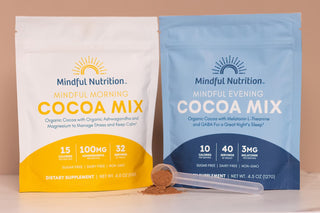Did you know one-third of Americans try to avoid gluten? If you're one of them, good news: cocoa powder is naturally gluten-free. But that doesn't mean hot cocoa mixes are always safe for folks avoiding gluten.
Read on to find out why.
Key Takeaways
- Unsweetened cocoa powder is generally gluten-free, as its only ingredient contains no gluten.
- However, cocoa mixes may contain additional ingredients that are not gluten-free.
- According to FDA regulations, foods labeled ‘gluten-free’ must contain less than 20 parts per million of gluten. Manufacturers are responsible for ensuring their products meet this standard.
- Some products that contain gluten-free ingredients may not be certified because there is a risk of cross-contamination in the production facility.
- If you're gluten intolerant, you may be able to handle trace amounts of gluten, but others may need to avoid gluten altogether.
See Related: Does Hot Chocolate Powder Ever Expire?
Cocoa Powder: Is it Naturally Gluten-Free?
Cocoa powder is made from just one ingredient: cacao beans. These beans don't contain gluten. So pure, unsweetened cocoa powder is naturally gluten-free.
But many cocoa mixes contain other ingredients. These other ingredients may also be naturally gluten-free.
For example, our Grandma's Cocoa Mix contains organic cane sugar and sea salt as well as organic alkalized cocoa powder. Our Organic & All-Natural Cocoa Mix swaps out the sugar for stevia, a zero-calorie, plant-based sweetener.
Cocoa powder, salt, sugar, and stevia are gluten-free food ingredients. However, a lack of gluten-containing ingredients doesn't always guarantee a product is completely gluten-free.
Gluten Intolerance vs. Celiac Disease
It's estimated that roughly one-third of Americans are trying to avoid gluten.
Different people have different tolerances for gluten. In general, individuals who are sensitive to gluten are split into two different camps.
The first and largest group of people who may want to avoid gluten are considered "gluten intolerant" or "gluten sensitive." Gluten intolerance is estimated to affect about 6% of the US population.
Folks with gluten-related conditions, such as gluten sensitivity or celiac disease, are generally advised by healthcare professionals to avoid gluten. If you think you may be sensitive to gluten, consult a qualified healthcare provider for guidance. Common symptoms include stomach pain, bloating, headaches, and issues defecating. Symptoms usually appear after eating gluten, and should dissipate when gluten is avoided.
However, gluten intolerance is not the same as celiac disease, which affects about 1% of the population. (Rates vary between different countries.) Celiac disease is an autoimmune condition in which gluten triggers the immune system to attack the body.
If you are intolerant to gluten, you may benefit from a gluten-free diet. However, you may also be able to tolerate small amounts of gluten. Each person is different.

Check Labels for Cross Contamination
What makes a product certified gluten-free? In order to be certified gluten-free, a product has to meet strict FDA requirements.
First, and most important, certified gluten-free products must contain less than 20ppm of gluten. That means that for every million particles of food, fewer than 20 are gluten or contain gluten.
This is the lowest level of gluten concentration that can reliably be detected. According to the FDA, even people with celiac disease can tolerate these minuscule amounts of gluten.
The "gluten-free" label is voluntary, so manufacturers don't have to put it on their products. Why might they choose not to use it?
Well, products aren't always manufactured in isolation. Manufacturers may produce multiple products in the same facility. Shared equipment can result in cross-contamination, where trace amounts of gluten are accidentally added to a product.
Tolerance to gluten can vary. Some individuals may react even to very small amounts, while others may not. It’s best to review labels carefully and follow advice from a healthcare professional.
Bonus: How to Make Refreshing Frozen Hot Chocolate
Cocoa Powder vs. Cacao Powder
The only main difference between cocoa powder and cacao powder is how they are processed. Cocoa powder is created by processing beans at a high temperature, and often contains added ingredients like sugar.
Cacao powder, meanwhile, is created by fermenting the beans and then processing them at a lower temperature. It's usually packaged without any other ingredients.
Gluten-Free Hot Chocolate Recipes
Making gluten-free hot cocoa or hot chocolate is simple. All you need is your favorite gluten-free hot cocoa powder. Combine it with hot water (or gluten-free milk) and enjoy.
But what if you want to add extra ingredients to your gluten-free hot chocolate? As long as those ingredients are also gluten-free, you should be fine.

Recipe for a Deep Chocolate Flavor
Be wary when adding chocolate to your hot cocoa. Chocolate bars sometimes contain additives, like emulsifiers, flavoring agents or barley malt powder, that can contain gluten.
For a rich chocolate flavor, we recommend adding some gluten-free chocolate to your favorite hot chocolate mix, like our Sugar-Free Hot Cocoa Mix. The heat of the hot chocolate should melt the chocolate chunks, creating a rich, thick chocolate flavor.
Most marshmallows are also gluten-free, so feel free to add them, too. Double-check the ingredient list for whipped cream, especially if its plant-based. If you're unsure, you can always make it at home, as the basic ingredients shouldn't contain gluten.
Other Frequently Asked Questions
Is Cocoa Powder Dairy Free?
Pure cocoa powder is naturally dairy-free. However, cocoa powder mixes may contain milk powder. And common hot chocolate toppings, like milk and whipped cream, contain dairy.
Remember, if you're unsure, always check the product label. Our Daily Mindful Evening Cocoa Mix, for example, is dairy-free. So is our Magnesium-Rich Mindful Morning Cocoa Mix.
To make a delicious dairy-free hot chocolate, consider using hot water instead of milk, or opt for a dairy-free milk alternative. Most plant-based milks are naturally gluten-free, though oat milk in particular may be at risk of cross-contamination during manufacturing.
Is Cocoa Powder Fair Trade?
The "FAIRTRADE" product label indicates a product has met strict ethical requirements set by Fairtrade International. The label is usually applied to single ingredients, but can also be applied to products made from ingredients that have been certified Fairtrade as well.
Is Cocoa Powder Sugar-Free and Keto-Friendly?
Because it is low in carbohydrates, unsweetened cocoa powder is often included in recipes by people following a ketogenic-style diet. However, many cocoa mixes contain sugar, which people following a keto diet usually want to avoid.
We offer a few sugar-free cocoa mixes, which might be suitable for people following a keto diet.
But if you're looking for keto-friendly, look no further than our Mindful Keto Cocoa. It includes ingredients such as collagen peptides and organic coconut medium-chain triglycerides. These ingredients are commonly used in products marketed to people following low-carb lifestyles.
Is Cocoa Powder Non-GMO?
GMO stands for genetically modified organisms. When scientists alter the genes of a plant, usually to make it more productive or contain certain nutrients, it's referred to as having been genetically modified.
Currently, there aren't any genetically modified cacao plants in use. However, scientists have sequenced the genome of the cacao plant and are studying ways to make it more resilient in the face of numerous threats, from climate change to diseases.
If you want to avoid GMO products, look for the "non-GMO" label. Many of our cocoa powder mixes are non-GMO, including our Organic Skinny Cocoa Mix, Keto Cocoa Mix, Mindful Calm Cocoa Mix, and others.
Is Cocoa Powder Vegan?
Pure cocoa powder is naturally vegan, as it contains no animal products. However, hot chocolate mixes may contain animal products, so make sure to check before buying.

Conclusion
Unsweetened cocoa powder is made from cacao beans, which do not contain gluten. However, people with celiac disease or gluten-related conditions should follow medical advice when choosing products.
If you're gluten intolerant, you may be able to tolerate trace amounts of gluten, as might be present in a naturally gluten-free product that isn't certified. But if you're particularly sensitive or are celiac, make sure to stick with products that are certified gluten-free.
Bonus: Check out this guide for removing hot cocoa stains from clothes.
Keep Reading: What Goes With Hot Chocolate? Hot Chocolate Pairings
--
Mindful Nutrition is a veteran-owned company with a passion for wellness. We use natural ingredients in our products, including melatonin, GABA, ashwagandha, and L-Theanine. Our hot cocoa blends are vegan, non-GMO, and plant-based, crafted to be a comforting addition to your daily ritual. We utilize third-party testing on all products to ensure purity, quality, and safety. To stay connected and learn more, follow us on Facebook, Instagram, and LinkedIn.
--
These statements have not been evaluated by the Food and Drug Administration. Our products are not intended to diagnose, treat, cure, or prevent any disease. The content on this website is for informational purposes only and is not intended as a substitute for advice from your physician or other healthcare professional. Always consult with a qualified healthcare provider regarding any medical condition or health concerns.















